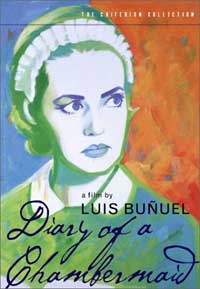The widescreen/scope black & white cinematography makes for a wonderfully visual film even before considering the story-content & performances in The Diary of a Chambermaid (Le Journal d'une femme de chambre, 1964). The film is set a bit later than Mirabeau's novel, about the 1920s rural France, when horse & buggy was turning into the automobile age, & antisemitism was in the air.
 As a chambermaid, our heroine Celestine (one of the great roles for Jeanne Moreau) has greater sophistication than those she works for, & she knows it. As it is her profession to be submissive, most everyone who meets her believes submissiveness is her true nature. But to the viewer it slowly becomes obvious she would gladly trade places with those whose birth rather than intelligence or achievement placed them above her. As a chambermaid, our heroine Celestine (one of the great roles for Jeanne Moreau) has greater sophistication than those she works for, & she knows it. As it is her profession to be submissive, most everyone who meets her believes submissiveness is her true nature. But to the viewer it slowly becomes obvious she would gladly trade places with those whose birth rather than intelligence or achievement placed them above her.
She's hired to serve the needs of a retired shoemaker who is in fact a foot & shoe fetishist who likes to dress Celestine in his best-loved shoes & have her parade them for him & let him kiss her beautifully shod feet. He'd then lock himself alone in his bedroom with the exciting shoes.
The old man's son-in-law Monsieur Monteil (Michel Picoli) is a lustful frustrated wannabe seducer with a frigid wife (Francoise Lugagne). He is such a failure with Celestine that he settles for raping Marianne ("Muni," an unusual naturalistic actress seen in small roles in several Bunuel films) after dragging her into the henhouse. Marianne is the mentally challenged servant whose inate goodness gets her savaged even by fellow servants.
The unwholesome groundskeeper Joseph (Georges Geret) is a worthless sadistic peasant involved in right-wing anti-labor anti-Jew politics, who serves as a spy to Madame Monteil the mistress of the house, getting others in trouble. As for the mistress of the house, she's a supreme bitch even to her husband, certainly to the servants.
Celestine takes everything in stride seeming sometimes bemused, rarely interested, but taking no one as seriously as they take themselves.
The day Monsieur Rabour (Jean Ozenne) died in his bed with favorite shoes all about him, the beautiful child Claire was raped & murdered in the woods. Celestine knows that Joseph had been in the woods at that time & is probably the culptrit. She liked Claire & as the police seem worthless, she attempts to solve the crime herself, letting filthy Joseph seduce her, trying to wheedle a confession out of him after winning his trust.
What will she do if she becomes certain? What will she do if he won't confess? Is she capable of killing him? What if she has guessed wrong, for despicable as this scummy groundskeeper might be, he is perhaps not that sort of monster.
Much more is going on in this Gordian knot of a tale, interweaving relationships leading in time to Celestine proving that were she top-dog, she would not be so submissive & wouldn't even be tolerant. It's a great film of the whole world's social upheavel, but writ small in a single household.
If it may be presumed to contain a few "lessons" in politics, it would be only that justice does not exist where power corrupts both those who have the power, & those who serve the powerful. In other words, people suck.
copyright © by Paghat the Ratgirl
|

 As a chambermaid, our heroine Celestine (one of the great roles for Jeanne Moreau) has greater sophistication than those she works for, & she knows it. As it is her profession to be submissive, most everyone who meets her believes submissiveness is her true nature. But to the viewer it slowly becomes obvious she would gladly trade places with those whose birth rather than intelligence or achievement placed them above her.
As a chambermaid, our heroine Celestine (one of the great roles for Jeanne Moreau) has greater sophistication than those she works for, & she knows it. As it is her profession to be submissive, most everyone who meets her believes submissiveness is her true nature. But to the viewer it slowly becomes obvious she would gladly trade places with those whose birth rather than intelligence or achievement placed them above her.